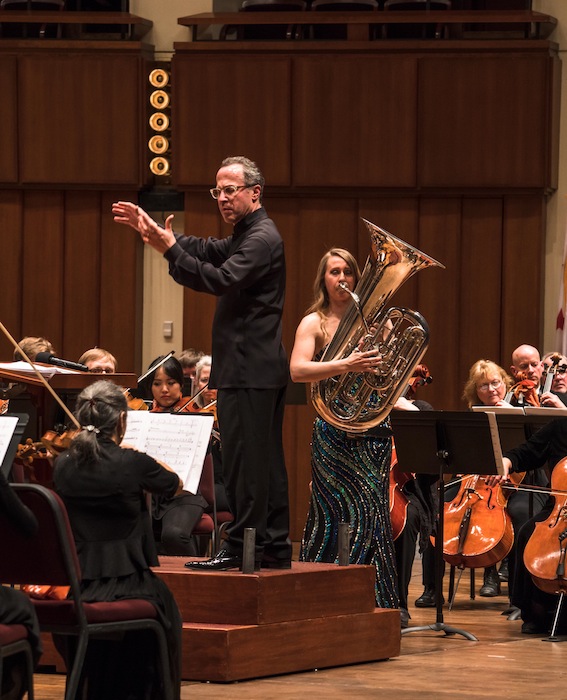A striking addition to the tuba repertory shines amid the Albany Symphony’s sugared SHIFT program

Carol Jantsch was the tuba soloist in Michael Daugherty’s “Reflections on the Mississippi,” performed with David Alan MIller and the Albany Symphony Orchestra at the Kennedy Center’s SHIFT Festival Wednesday night. Photo: Tony Hitchcock.
The SHIFT Festival has made it to a second season, which means it must be a tradition. This celebration of path-blazing American orchestras, co-presented by Washington Performing Arts and the Kennedy Center in cooperation with the League of American Orchestras, presented the Washington debut of the Albany Symphony in the Kennedy Center Concert Hall Wednesday night.
David Alan Miller, music director of the Albany Symphony since 1992, has burnished this ensemble’s reputation as a champion of contemporary American music. The orchestra performed four works premiered within the last decade, all by American composers, three of whom joined the group on stage during this concert. One of them, Michael Daugherty, warmly dubbed the ensemble “the hardest-working orchestra in America.”
Daugherty’s piece, a concerto for tuba from 2013 called Reflections on the Mississippi, was the high point of the evening. An evocation of the composer’s memories of that quintessential American river, the piece explores many traditional sound worlds. The washboard made an appearance in the percussion section in the second movement, for example, and as the last movement took us toward the river’s destination in New Orleans, the rhythms of Dixieland, music that often featured the tuba, bounced freely.
Carol Jantsch, the young principal tubist of the Philadelphia Orchestra, brought all of her experience premiering the piece to bear in an outstanding performance. Standing, she played the part on an F tuba, the heavy weight partly supported by being hooked onto a belt. Slightly smaller in size than the CC tuba normally heard in symphonic repertoire, it was suited to the gorgeous writing Daugherty gave her, which is far more melodic than the fundamental bass reinforcement or comic oom-pah effects generally associated with the tuba.
Even more striking, Daugherty did not go the route often favored in contemporary concerto writing, looking for every possible special effect or sonic oddity the instrument could produce. Without even calling for a mute, Daugherty showed that the tuba can sing, with longing arches of melody in the first movement, and it can dance, leading the snappy syncopations and jumping riffs of the second and fourth movements.
Daugherty edged close to the boundary of sentimentality in the third movement, “Prayer,” quoting a tune that sounded something like “Yes, Jesus, Loves Me.” The misty use of bell tree and other metallic percussion was also overdone, but, all in all, this is a worthy addition to a limited repertoire for the instrument.
In this selection of American contemporary music, Miller went exclusively for neoclassical composers, and something more edgy and dissonant would have varied the sweet palate of the evening. Dorothy Chang’s mini-oratorio The Mighty Erie Canal felt like an earnest, well-performed school pageant. Young singers from Voices of Glassmanor, National Cathedral School Lower School Guild, and Children’s Chorus of Washington were clear and strong on the unison vocal part, enthusiastically clapping and yelling “Yeah!” for the big finish.
Programming two piano concertos may have been the tipping point, prolonging a concert that opened with extensive speeches from the presenter and various New York political figures. Joan Tower’s Still/Rapids, a busy limning of still and rushing water, reveled in Ravelian harmonies, the more complicated runs revealing cracks in the orchestra’s ensemble unity. Here and elsewhere, it was Miller’s effective, enthusiastic leadership that held thing together.
Michael Torke’s The Manhattan Bridges sounded alternately derivative of Rachmaninoff and Gershwin, its broad melodic, jazzy appeal not stopping swaths of audience members from leaving the hall early. In both pieces the prime attraction was the steely, authoritative playing of pianist Joyce Yang on the solo part. This piece, as well as the Daugherty, are now part of the enduring musical legacy of the Albany Symphony, recorded for the pioneering hometown label Albany Records.
